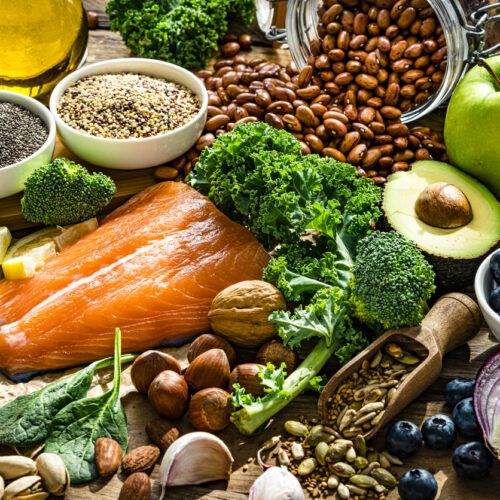
It might be trending on social media, but can your diet really tame too-high cortisol levels? And is cortisol to blame for weight gain anyway? Here’s what you need to know.
There are at least 50 hormones in the human body, but one of them is outshining the others right now, at least as far as notoriety goes. Meet cortisol, often referred to as the stress hormone because it naturally increases when we’re stressed. Terms like cortisol belly, cortisol face and cortisol diet have been doing the rounds on social media lately, off the back of claims that high cortisol levels lead to abdominal and facial weight gain, and a diet can counteract the effects. But what does the science say? Does research back up the suggestion that being regularly stressed out not only causes weight gain, but makes it settle in specific spots? And if so, can you really tweak what you eat to beat the effect?
What exactly is cortisol?
Released by the body’s two adrenal glands which are located on top of each kidney, cortisol levels really do ramp up in your bloodstream when you feel stressed. It’s essential for that healthy fight or flight response, but that’s not all. Cortisol also plays a role in controlling blood pressure and blood sugar levels, helps reduce inflammation, and contributes to a healthy immune system. Like other hormones, too much or too little can be a problem, causing physical, emotional or cognitive symptoms.
So are ‘cortisol belly’ and ‘cortisol face’ real?
The answer is, it’s complicated. While neither are recognised as official medical conditions, there is a link between chronically elevated cortisol levels and some patterns of fat distribution. Two of the most common symptoms of a condition called Cushing’s syndrome, where the body is exposed to too much cortisol, are a rounded face and weight gain, particularly around the abdomen. Other symptoms include developing a hump between the shoulders, and skin problems like slow healing of wounds, bruising and stretch marks on the thighs and stomach. You should see your doctor if you have symptoms of Cushing’s syndrome because if it’s left untreated, it can lead to becoming very unwell. However, Cushing’s is very rare. Caused by various factors, among them a tumour in the brain or adrenal glands, overgrowth of the adrenal glands, or taking corticosteroids over a long period, just 40 people are diagnosed with it in Australia each year. Based on that, estimates suggest that between 300 and 1600 people in Australia, which has a population of more than 27 million, are currently living with it.
So, assuming Cushing’s syndrome isn’t to blame if you’ve noticed you’re gaining weight around your face or stomach recently, could your never-subsiding stress levels – and the constant surge of cortisol that causes – be the culprit? Stress and weight gain: is there a link? Research shows there is a genuine connection between ongoing stress and the number on the scales. And while it’s a complex relationship, one explanation may be the fact that over time, persistently elevated cortisol levels can increase hunger and fat storage. As for whether high stress levels make weight gain in specific areas more likely, research suggests that’s more of a maybe.
While studies examining a link between excessive stress and a puffy face are lacking, some studies do suggest that experiencing a lot of stress, or being particularly vulnerable to the effects of stress, may bump up the risk of gaining visceral fat. That’s belly fat that’s stored deep within the abdominal cavity, where it surrounds organs and can cause serious health issues such as heart disease, diabetes and some cancers. However, experts caution that even if stress-related cortisol can influence where fat gathers, fat distribution is dictated by a complex mix of everything from genetics and diet to sleep, exercise and a wide range of hormones – not just one of them.
Could a ‘cortisol diet’ help?
If you’re worried that stress is affecting your health, is it possible to turn things around by eating certain foods? According to a recent University of South Australia study, following a Mediterranean diet can reduce symptoms of stress. This backed up a 2018 European study which showed that eating like they do in the Mediterranean not only improved people’s resistance to stress, but lowered their cortisol levels as well. Some research has also found an association between eating a Mediterranean diet and a reduction in central obesity or stomach size, but there’s no suggestion that‘s thanks to the diet’s potential impact on stress or cortisol levels.
A Mediterranean diet includes plenty of fresh fruit and vegetables, whole grains and seeds, nuts, legumes and olive oil. Fish and seafood is typically eaten a couple of times a week, while small portions of dairy and lean poultry can be eaten daily. Red meat and processed foods are typically only eaten occasionally.
Related content
Article sources and references
- Arroyo Tardio P et al. 2023. Food-induced cortisol secretion is comparable in lean and obese male subjects. Endocr Connect. 12(7):e230126.
- Atrium Health Wake Forest Baptist University. 2009. New research links social stress to harmful fat deposits, heart disease. Available at wakehealth.edu
- Australian Bureau of Statistics. Population. https://www.abs.gov.au
- Bendall CL et al. 2018. Central obesity and the Mediterranean diet: A systematic review of intervention trials. Crit Rev Food Sci Nutr. 58(18):3070-3084.
- Better Health Channel. Hormones – cortisol and corticosteroids. https://www.betterhealth.vic.gov.au
- Bond University. Techniques to de-stress focus of new Bond University study.https://www.bond.edu.au
- Caplin A et al. 2021. The effects of exercise intensity on the cortisol response to a subsequent acute psychosocial stressor. Psychoneuroendocrinology. 131:105336.
- Carvalho K et al. 2018. Does the Mediterranean Diet Protect against Stress-Induced Inflammatory Activation in European Adolescents? The HELENA study. Nutrients. 10(11):1770.
- Cleveland Clinic. Hormones. https://www.clevelandclinic.org
- Cleveland Clinic. Diaphragmatic Breathing. https://www.clevelandclinic.org
- Cornell University. 2020. Spending time in nature reduces stress, research finds. https://www.cornell.edu
- CSIRO. Is breakfast protein the secret to weight loss?https://www.csiro.au
- CSU Davis Health Wellness News. Gratitude. https://www.health.ucdavis.edu
www.healthyfood.com









